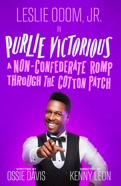Why Leslie Odom Jr. Says Ossie Davis’ Purlie Victorious Deserves to be on Broadway

The first revival of Purlie Victorious: A Non-Confederate Romp Through the Cotton Patch has arrived on Broadway. The play is currently in previews at the Music Box Theatre and slated to open on September 27. Ossie Davis’ play tells the story of a Black preacher’s scheme to reclaim his inheritance and win back his church. Producer-actor Leslie Odom, Jr., stars in the title role.
In the latest episode of The Broadway Show with Tamsen Fadal, Odom, co-star Kara Young, director Kenny Leon plus Davis and Ruby Dee’s children reflect on the origin of Purlie Victorious, and why Davis had to find a comedic way to tell this story about race.
In speaking to Beth Stevens, Odom acknowledged his personal connection to the play and the artists who shaped it. His daughter is named after Ruby Dee, Ossie Davis’ wife, who starred in the original Broadway mounting of Purlie Victorious.
Odom first encountered Davis and Dee through film. “Thanks to Spike Lee’s reverence for their contributions to the arts, too, a whole generation of us really got to know Ossie and Ruby through Spike’s work, at first at least,” Odom. said. Davis and Dee starred in Lee’s 1989 film Do the Right Thing. The trio worked together again on the 1991 film Jungle Fever. Even greater than their impact on camera, Davis and Dee organized the performances between speeches for Dr. Martin Luther King, Jr.’s March on Washington, and Davis penned the eulogy for Malcom X.
“That’s a big life that they both lived,” Odom continued. “All the lives that they touched and the leaders that depended on them… They’re giants. It’s not that any of us deserves Broadway, Mr. Davis deserves Broadway.”
“When I think about American artists and I think about American activists I think about Ruby Dee, Ossie Davis,” said Leon. “They’re in the same army with Arabella Fields, Sidney Poitier, August Wilson, Toni Morrison.”
Though Davis and Dee’s lives were big, Purlie Victorious came from humble beginnings.
“The story goes that they said, ‘We want you to write a play about race in America,’” Leon shared. “[Davis] thought about it and said, ‘That’s too painful. The only way I can get through it is to tell it through humor.’”
The result, as Young put it, is a “dissection in the absurdity of the social and racial structures of this America.”
“He wrote a play about America and what’s going to keep America beautiful,” Leon said. “And 62 years later, we’re looking at the challenges of our country and this is a salve, a balm to heal what’s wrong with America.”


